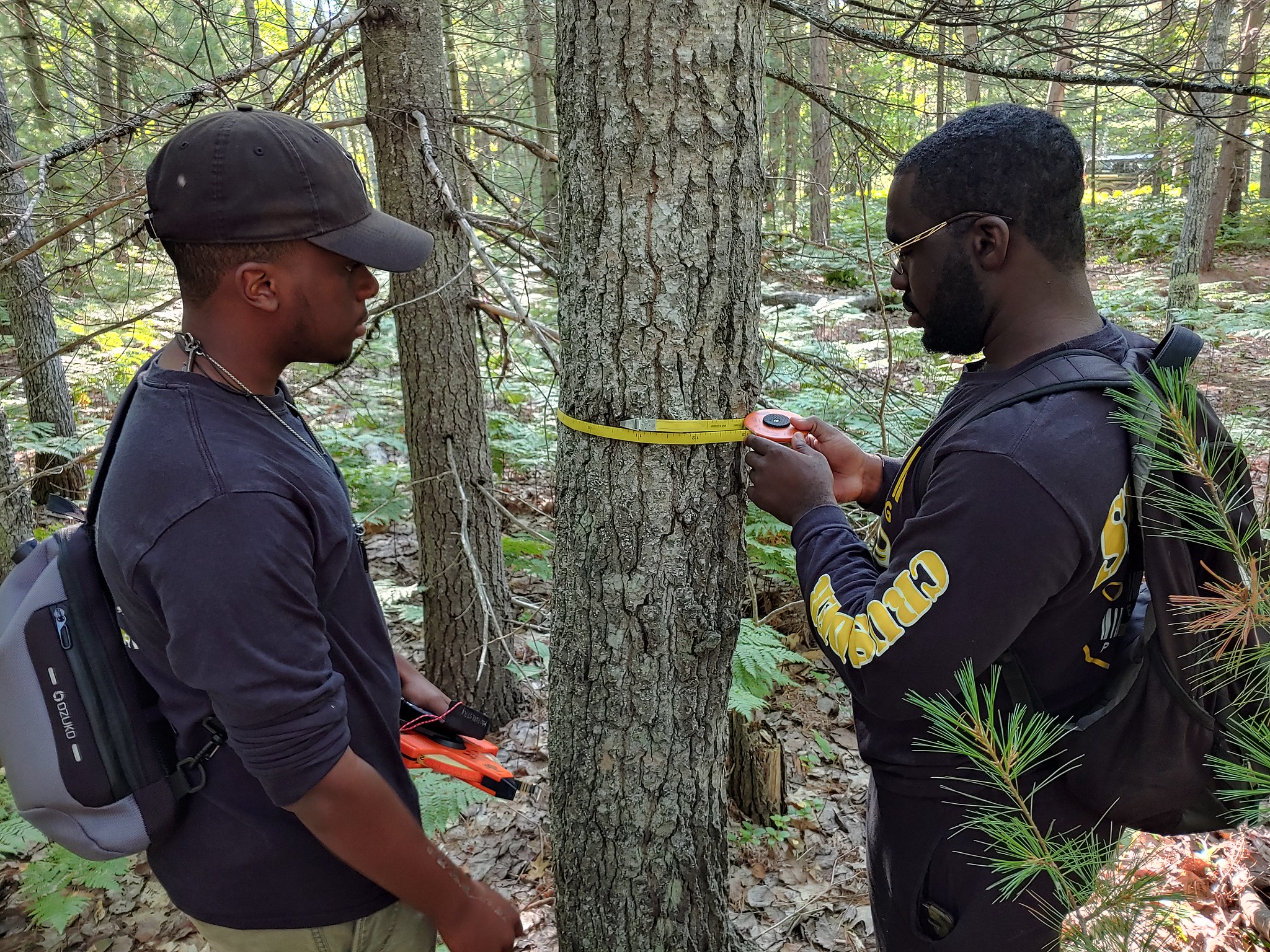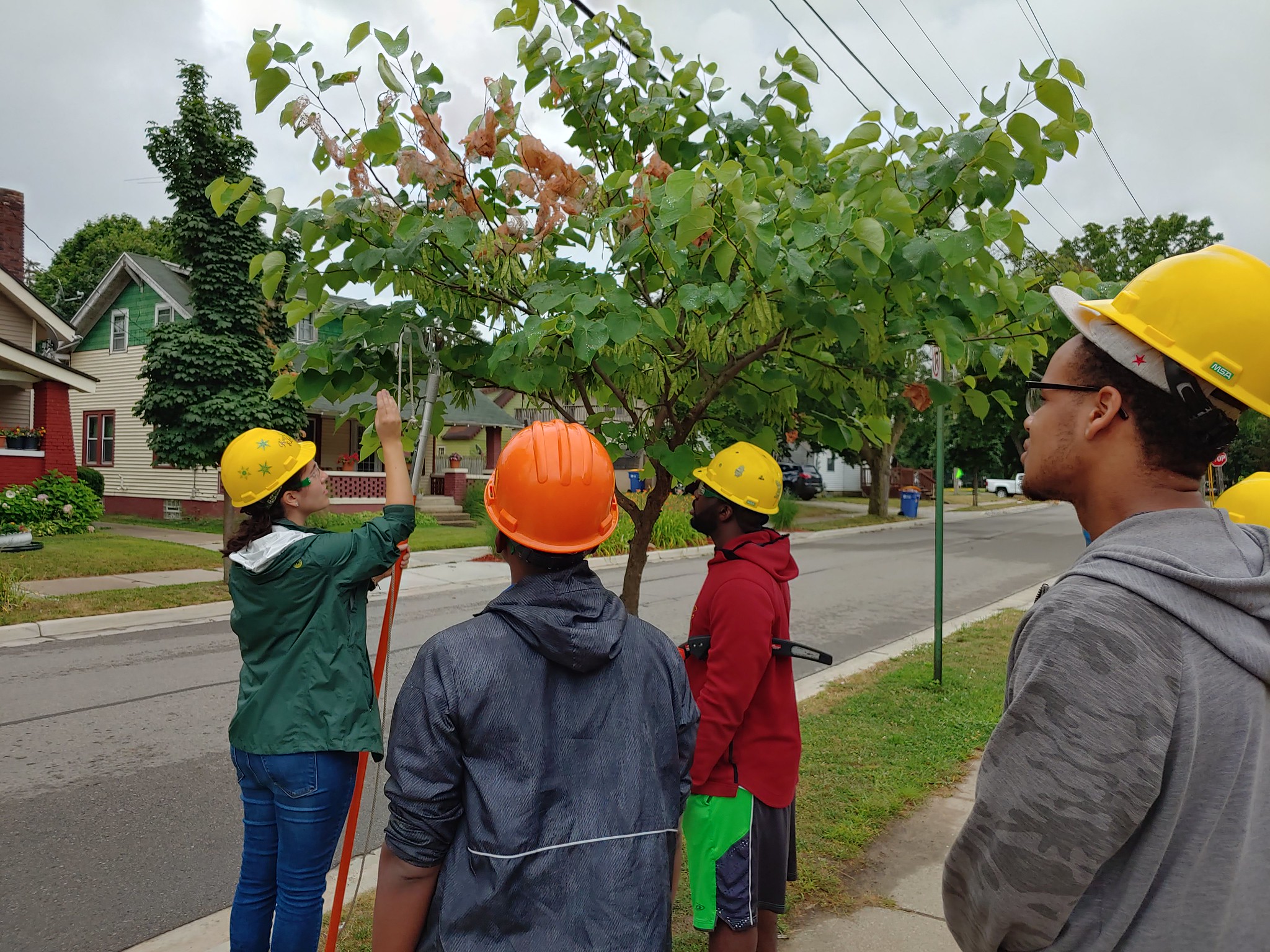Training future foresters new part of partnership between MSU, community colleges, industry
Higher Education Challenge grant will fund forestry programs at Bay, Muskegon Community colleges

EAST LANSING, Mich. – Providing new educational opportunities for prospective foresters is the goal of a new collaboration between Michigan State University (MSU) Department of Forestry, the Institute of Agricultural Technology (IAT), Bay College (BC) and Muskegon Community College (MCC).
Justin Kunkle, assistant director of undergraduate studies in the MSU Department of Forestry and HEC project director, is leading the partnership to establish certificate programs. The programs will teach professional forestry at BC in Escanaba, and urban and community forestry at MCC in Muskegon.

The work is funded by a $749,000 Higher Education Challenge (HEC) grant from the USDA’s National Institute of Food and Agriculture (NIFA). The first cohort of students is expected as early as fall 2021.
Organizers of the program will engage stakeholders in the forestry industry to assist with educational content and programming identified by industry and employers.
“One of the hallmarks of IAT is to provide educational programs for individuals who are place-bound, and that's one of the keys behind this program with the partnerships that we have with our community colleges around the state of Michigan,” said Randy Showerman, director of IAT and co-project director.
“IAT is focused on addressing the needs of the industry within those local communities. As we look at the role of a community college, one of their major roles is the training of employees within their region, and that's exactly what this program will do. It is going to train individuals that want to stay within a particular area for employment that is currently available today.”
The project team also includes:
- David Rothstein, professor of Forestry and Biogeochemistry in the MSU Department of Forestry
- Asia Dowtin, assistant professor of Urban and Community Forestry in the MSU Department of Forestry
- Jeno Rivera, associate professor of Community Education and Engagement in the Residential College in the Arts and Humanities and the Department of Community Sustainability at MSU
- Daniel Rinsema-Sybenga, dean of Academic Affairs at Muskegon Community College
- Brian Black, instructor of Biology and Environmental Science at Bay College
- Matthew Barron, vice president of academic affairs at Bay College
- Jesse Randall, director at MSU Forest Biomass Innovation Center
In addition to the community colleges, the partnership includes the Michigan Department of Natural Resources, local forestry businesses and groups such as the International Society of Arboriculture-Michigan and the Michigan Association of Timbermen.

“This program is a natural fit for our institution, as well as our community,” said Matthew Barron, vice president of academic affairs at Bay College. “Forestry is a very large industry in our region, with a large paper mill and a vast amount of natural resources. With MSU’s historical focus on natural resources, their extension offices, and the agriculture program in collaboration with Bay College, we are able to serve our local farming and logging communities. Between agriculture and forestry, most of our population is affected by these industries.”
Through these new educational offerings, MSU is hoping to broaden its reach to students across the state who might have an interest in natural resources fields.
“Having MSU expand its flagship programs in West Michigan provides a critical pathway for residents who otherwise would lack the opportunity to learn and grow in this manner,” said Dale Nesbary, president of Muskegon Community College.
“We plan to support agriculture, food and natural resources post-secondary educational programs in West Michigan and this includes collaborating with MSU on providing classroom space for our respective students, faculty and community partners. Moreover, we expect to identify and recruit a broad array of students, with an emphasis of students of color and those from urban areas, in addition to seeking those traditionally sought for such programs.”

MSU forestry professors, MSU Extension experts, forestry industry professionals and local foresters will develop the curriculum. MSU Forest Biomass Innovation Center (FBIC) in Escanaba will provide non-timber forest product education for students, including instruction on maple syrup, Christmas trees, ginseng, as well as examples of UAV technology in forestry applications.
“Students will leave this program with a better understanding of forestry, forest systems and the implications of good and bad management regimens on the entire system,” said Jesse Randall, director at FBIC. “They will understand the economic opportunities that exist across a broader range than just traditional forest harvesting, and the increasing adoption and use of advanced technology in forestry.”
Each program will begin with eight students. MSU and IAT are partnering with Community enCompass, Michigan FFA’s Agriculture, Food, & Natural Resources Education Career Development program, as well as BC and MCC to recruit students once the programs complete curriculum review.
The program will also provide opportunities to attend professional meetings and provide internships
“Students are going to travel all throughout the state of Michigan and possibly beyond to get exposure to different forest systems,” Kunkle said. “There's also been commitment from the industry groups to develop hands-on experiences for the students to get exposure to the many diverse career pathways within the field.”
“The nice thing about this program is it offers what I would call multiple entry points and exit points from the program. Students would be able to exit the program after two years with a certificate and associate degree and be ready for employment, or they could decide they want to complete a bachelor's program where there will be a path to MSU or other universities.”
MSU IAT hopes to expand the forestry certificate program to other community college partners across the state in the future.
“I want MSU to be known as the hub for educational activities related to forestry production and urban forestry,” Showerman said.
“There's a need, within the state of Michigan, for individuals that will have the training that these certificate programs are going to provide,” Showerman said. “This grant allows IAT to move more into the realm of the natural resources, and I see this forestry program as being the first, but then I see other natural resource programs evolving out of this.”
Request more information about the new forestry certificate program, as well as IAT.
Michigan Forestry Facts
- Michigan has about 20 million acres of forest, covering about 53% of the State.
- Michigan forests support 100,000 jobs and annually adds 20 billion dollars to the state economy ($500+ billion GDP).
- Annual harvest in Michigan would form a cord pile 3,500 miles long.
- The most serious threats to Michigan forests are loss of forest industry, invasive species, intensive browsing by deer, benign neglect (lack of management), climate change, and forest ownership parcelization.
- Forest industry is the third largest manufacturing sector in Michigan, behind automobiles and agriculture.



 Print
Print Email
Email

